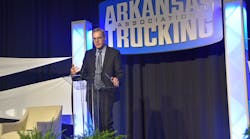Trucking's story is America's story, so tell it, says ATA's Spear
LITTLE ROCK, Arkansas—Trucking has a compelling story to tell, but it's critical that industry voices tell that story using "truth and data" rather than "rhetoric and emotion" to win policy battles at the federal and state levels, American Trucking Associations President and CEO Chris Spear explained here Wednesday.
"Common sense matters, and I think that resonates with both sides of the aisle," Spear said in an address at the 2023 Arkansas Trucking Association Conference & Vendor Showcase. "Why does trucking matter? There are so many issues that this industry touches that are just as important to everyday Americans as they are for trucking. So telling our story from that perspective really disarms our opponents."
The problem, however, is that it's increasingly a challenge to get lawmakers to focus on actually making laws. Noting that his appearance here was his fourth since taking the helm at ATA, Spear recalled that with each visit he suggested the divisiveness couldn't get any worse—yet it has.
Many members of Congress are "more prone to Twitter" and chasing soundbites than they are interested in the process of passing legislation.
"Compromise is something that I tend to preach, having worked on Capitol Hill for many years," he said. "That's legislating, and it's not a very pretty process—in fact, it can be pretty ugly. But the product, the end outcome, can be something to be proud of if you roll up your sleeves and you really go to work. But this is a Congress that has not had the luxury of understanding that process."
See also: ATA's Spear calls out 'unrealistic' trucking emissions timelines
To get the attention of lawmakers, the crucial and often competing modes in the supply chain—trucking, rail, the ports—must break down "traditional barriers" and speak with one voice, Spear suggested, pointing to the common challenges of covid, inflation, high fuel prices, and labor shortages.
"We're always looking through the lens of growth: How do we continue growing in a safe and responsible way? But trying to navigate this divisiveness is proving to be very, very challenging," he said. "We have to understand the political landscape. It's not that we have to like it, but you've got to understand it. Because if you don't it will unravel your agenda quicker than you can imagine. If you do understand it, you can navigate it well, and you can find victories. And we're all about winning."
See also: New regulations: What are the odds?
ATA's concerns are many, and trucking is being "wrongfully attacked" frequently, Spear suggested. He then outlined the industry's wide range of challenges and opportunities, speaking for an hour without a teleprompter or notes, yet always with critical facts to support ATA's policies and positions.
"We like tough questions—we're a tough industry. And I like to think we have the right answers," Spear said. "This story—your story—is an American story. It's one that we need to tell at the highest volume."
Laundry list of trucking concerns
While Spear put energy and the environment at the top of ATA's list of challenges over the next decade, I'll address his take on emissions regulations and electric trucks in another post. But he also updated the audience on the status of several of the other key issues for truck fleets.
How debt ceiling deal affects trucking
House Speaker Kevin McCarthy doesn't wield the power of previous speakers, and he has to straddle "a fine line" to come up with a deal that will mollify Democrats yet not alienate Republicans. Regardless, it would be "catastrophic" for trucking—and every industry—if an increase in the debt ceiling does not pass, Spear explained.
"This deal is paramount," he said. "There will be a lot of chest-thumping, a lot of pots and pans being banged, but in the end, I think they'll get a deal. Hopefully, it will be something both sides can take credit for and blame each other for—and that's a sign of a pretty good consensus."
Workforce regulations
While California's Assembly Bill 5, which essentially does away with independent contractors in trucking, has garnered a lot of attention, the U.S. Department of Labor is also developing a rule, while the National Labor Relations Board has a related decision pending.
"This is a concerted attack, created by the unions and the plaintiffs' bar, to organize this crop of talent," Spear said. "This is a removal of choice. Some of our most successful companies today started with one truck, others as an owner-operator or an independent contractor, and grew their business. This is the American spirit—and it's being crushed, crushed by the unions who spent, by the way, $1.8 billion in the last presidential election on lobbying and campaign donations. This is an 800-pound gorilla. And we've got to stand up and fight for our industry."
Marijuana use
While recreational marijuana use is being legalized in states across the country, the implications for trucking are being met with silence from Congress and federal agencies.
"If you want to smoke weed, smoke weed if it's legal—just don't get behind the wheel of an 80,000-pound vehicle," Spear said. "Without that leadership, without that clarity, we are going to be put in a very litigious environment between federal rules, regulations, and states saying it's okay to light up."
Speed limiters
ATA's policy on speed limiters "has evolved," Spear noted, as fleets experience the benefits of technologies such as automatic emergency braking and adaptive cruise control. The association supports a 65 mph federal speed limit for tractor-trailers, or 70 mph for trucks equipped with safety systems.
"These are all things that have not only improved performance but have benefits to fuel efficiency and certainly have not compromised safety," Spear said.
Infrastructure
Spear pointed to the "incredible surge" in federal funding for roads and bridges over the past five years, up 38% thanks to the big infrastructure and jobs bills. For trucking's part, Spear noted that ATA and the Owner-Operators Independent Drivers Association are working together to push for projects to expand truck parking.
"When we lock arms on an issue, it has an impact," he said, noting that a few key disagreements between ATA and OOIDA can be problematic for trucking's message in Washington. "I don't really understand why 90% of the issues we actually agree on, then we fight with them on 10%—but when we do come together, it's making a difference."




